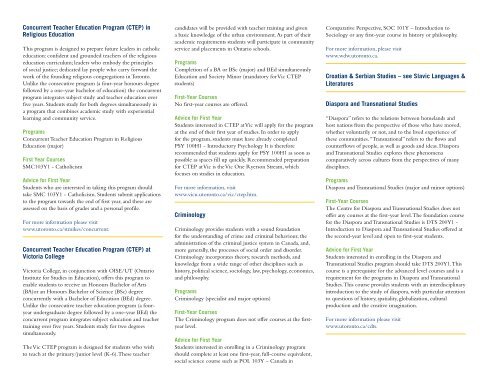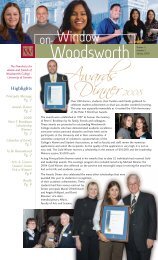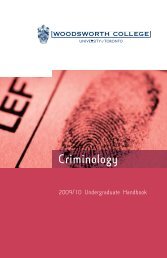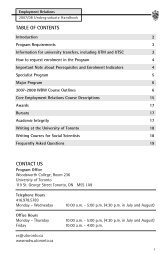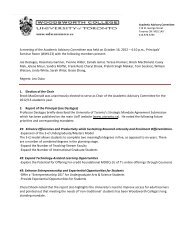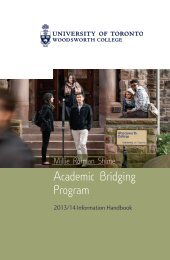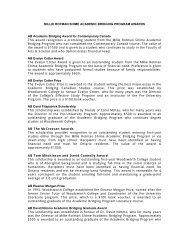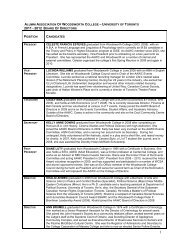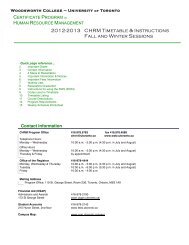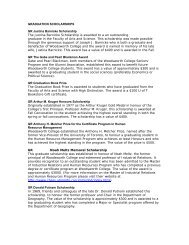First-Year Handbook 2009/10 - Woodsworth College - University of ...
First-Year Handbook 2009/10 - Woodsworth College - University of ...
First-Year Handbook 2009/10 - Woodsworth College - University of ...
You also want an ePaper? Increase the reach of your titles
YUMPU automatically turns print PDFs into web optimized ePapers that Google loves.
Concurrent Teacher Education Program (CTEP) inReligious EducationThis program is designed to prepare future leaders in catholiceducation: confident and grounded teachers <strong>of</strong> the religiouseducation curriculum; leaders who embody the principles<strong>of</strong> social justice; dedicated lay people who carry forward thework <strong>of</strong> the founding religious congregations in Toronto.Unlike the consecutive program (a four-year honours degreefollowed by a one-year bachelor <strong>of</strong> education) the concurrentprogram integrates subject study and teacher education overfive years. Students study for both degrees simultaneously ina program that combines academic study with experientiallearning and community service.ProgramsConcurrent Teacher Education Program in ReligiousEducation (major)<strong>First</strong> <strong>Year</strong> CoursesSMC<strong>10</strong>3Y1 - CatholicismAdvice for <strong>First</strong> <strong>Year</strong>Students who are interested in taking this program shouldtake SMC <strong>10</strong>3Y1 - Catholicism. Students submit applicationsto the program towards the end <strong>of</strong> first year, and these areassessed on the basis <strong>of</strong> grades and a personal pr<strong>of</strong>ile.For more information please visitwww.utoronto.ca/stmikes/concurrent.Concurrent Teacher Education Program (CTEP) atVictoria <strong>College</strong>Victoria <strong>College</strong>, in conjunction with OISE/UT (OntarioInstitute for Studies in Education), <strong>of</strong>fers this program toenable students to receive an Honours Bachelor <strong>of</strong> Arts(BA)or an Honours Bachelor <strong>of</strong> Science (BSc) degreeconcurrently with a Bachelor <strong>of</strong> Education (BEd) degree.Unlike the consecutive teacher education program (a fouryearundergraduate degree followed by a one-year BEd) theconcurrent program integrates subject education and teachertraining over five years. Students study for two degreessimultaneously.The Vic CTEP program is designed for students who wishto teach at the primary/junior level (K-6). These teachercandidates will be provided with teacher training and givena basic knowledge <strong>of</strong> the urban environment. As part <strong>of</strong> theiracademic requirements students will participate in communityservice and placements in Ontario schools.ProgramsCompletion <strong>of</strong> a BA or BSc (major) and BEd simultaneouslyEducation and Society Minor (mandatory for Vic CTEPstudents)<strong>First</strong>-<strong>Year</strong> CoursesNo first-year courses are <strong>of</strong>fered.Advice for <strong>First</strong> <strong>Year</strong>Students interested in CTEP at Vic will apply for the programat the end <strong>of</strong> their first year <strong>of</strong> studies. In order to applyfor the program, students must have already completedPSY <strong>10</strong>0H1 - Introductory Psychology It is thereforerecommended that students apply for PSY <strong>10</strong>0H1 as soon aspossible as spaces fill up quickly. Recommended preparationfor CTEP at Vic is the Vic One Ryerson Stream, whichfocuses on studies in education.For more information, visitwww.vicu.utoronto.ca/vic/ctep.htm.CriminologyCriminology provides students with a sound foundationfor the understanding <strong>of</strong> crime and criminal behaviour, theadministration <strong>of</strong> the criminal justice system in Canada, and,more generally, the processes <strong>of</strong> social order and disorder.Criminology incorporates theory, research methods, andknowledge from a wide range <strong>of</strong> other disciplines such ashistory, political science, sociology, law, psychology, economics,and philosophy.ProgramsCriminology (specialist and major options)<strong>First</strong>-<strong>Year</strong> CoursesThe Criminology program does not <strong>of</strong>fer courses at the firstyearlevel.Advice for <strong>First</strong> <strong>Year</strong>Students interested in enrolling in a Criminology programshould complete at least one first-year, full-course equivalent,social science course such as POL <strong>10</strong>3Y – Canada inComparative Perspective, SOC <strong>10</strong>1Y – Introduction toSociology or any first-year course in history or philosophy.For more information, please visitwww.wdw.utoronto.ca.Croatian & Serbian Studies – see Slavic Languages &LiteraturesDiaspora and Transnational Studies“Diaspora” refers to the relations between homelands andhost nations from the perspective <strong>of</strong> those who have moved,whether voluntarily or not, and to the lived experience <strong>of</strong>these communities. “Transnational” refers to the flows andcounterflows <strong>of</strong> people, as well as goods and ideas. Diasporaand Transnational Studies explores these phenomenacomparatively across cultures from the perspectives <strong>of</strong> manydisciplines.ProgramsDiaspora and Transnational Studies (major and minor options)<strong>First</strong>-<strong>Year</strong> CoursesThe Centre for Diaspora and Transnational Studies does not<strong>of</strong>fer any courses at the first-year level. The foundation coursefor the Diaspora and Transnational Studies is DTS 200Y1 -Introduction to Diaspora and Transnational Studies <strong>of</strong>fered atthe second-year level and open to first-year students.Advice for <strong>First</strong> <strong>Year</strong>Students interested in enrolling in the Diaspora andTransnational Studies program should take DTS 200Y1. Thiscourse is a prerequisite for the advanced level courses and is arequirement for the programs in Diaspora and TransnationalStudies. This course provides students with an interdisciplinaryintroduction to the study <strong>of</strong> diaspora, with particular attentionto questions <strong>of</strong> history, spatiality, globalization, culturalproduction and the creative imagination.For more information please visitwww.utoronto.ca/cdts.


